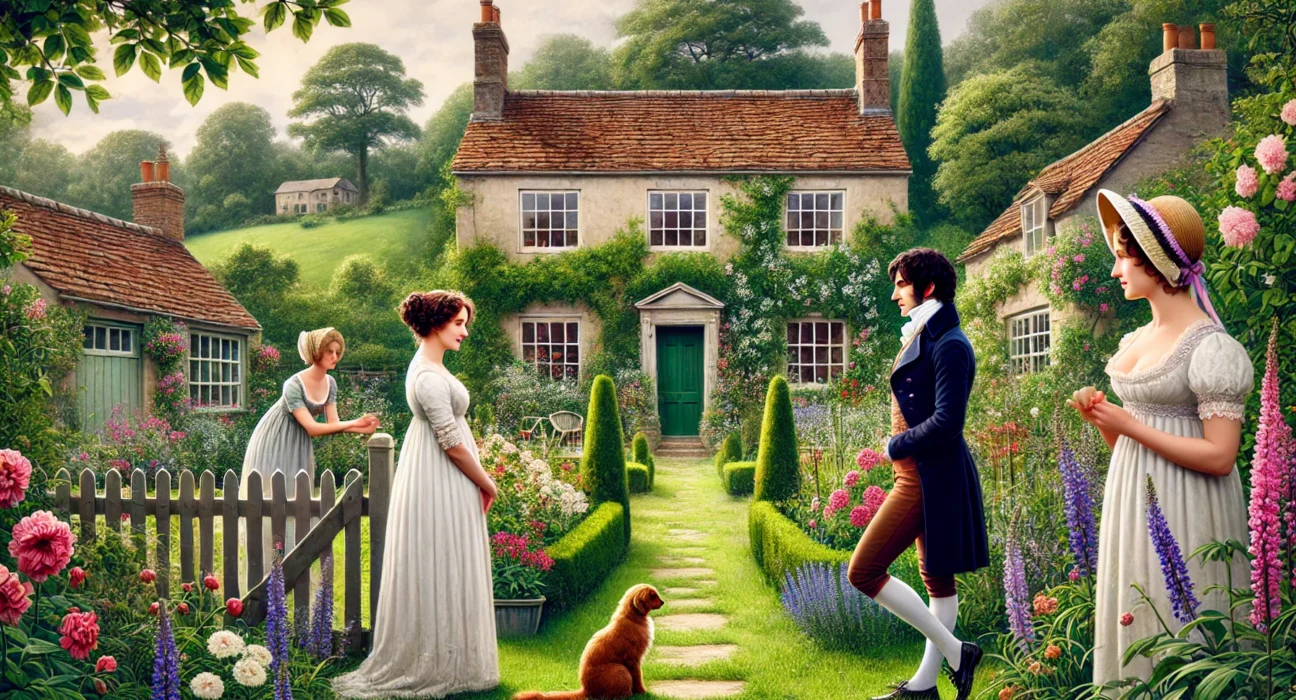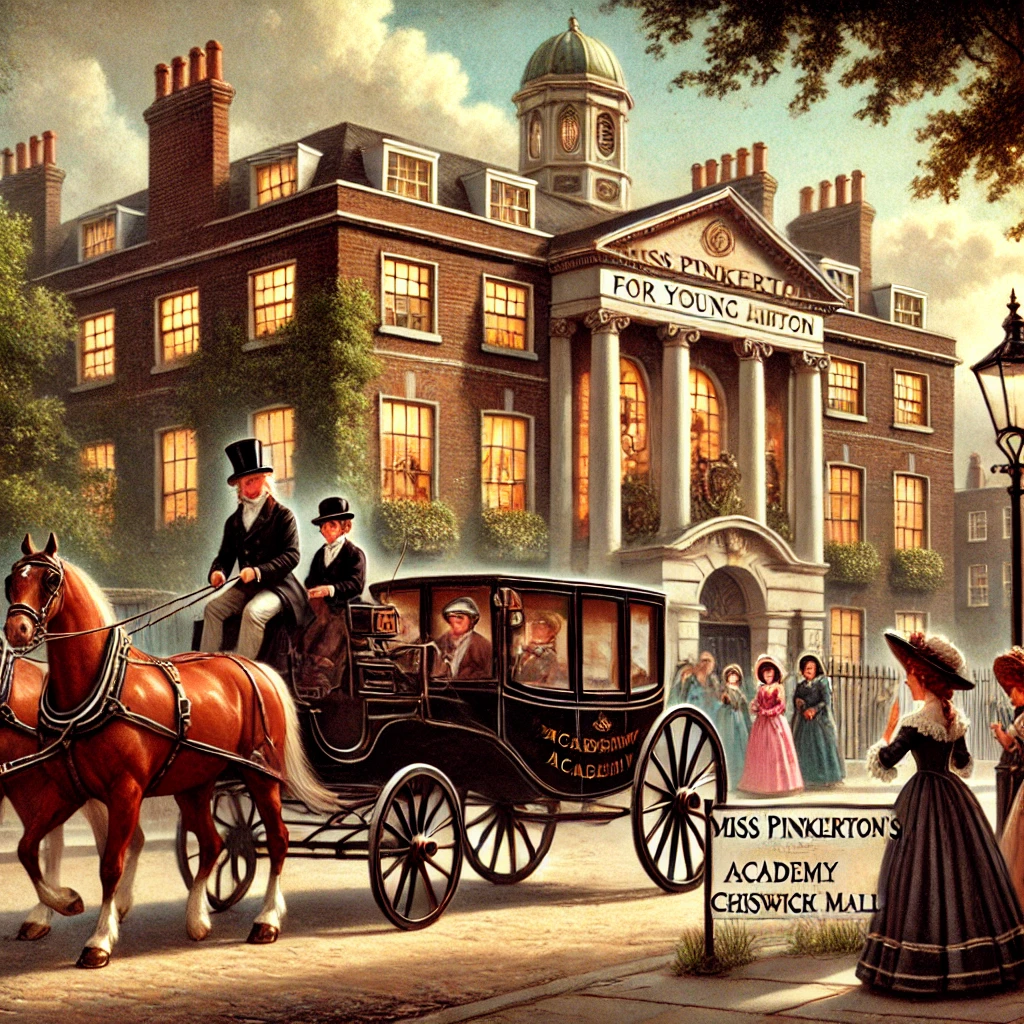Sense and Sensibility, written by Jane Austen, was first published in 1811. It is Jane Austen’s first published novel. It follows the lives and romantic trials of the Dashwood sisters, Elinor and Marianne, as they navigate the tension between “sense” (practicality) and “sensibility” (emotion) in their relationships and family life. Set in the backdrop of Regency England, the novel explores issues of love, inheritance, societal expectations, and the financial and emotional vulnerability of women.
Plot Summary
The Dashwood family had long been established in Sussex, residing at Norland Park. This large estate had been home to several generations of respectable Dashwoods, earning them the good opinion of their neighbors. The latest owner, an elderly bachelor, had lived there with his sister until her death. Following her demise, he invited his nephew, Henry Dashwood, and his family to live with him, intending to bequeath the estate to Henry upon his own death.
Henry Dashwood had one son, John, from a previous marriage, and three daughters, Elinor, Marianne, and Margaret, with his current wife. Although John was well-provided for through his mother’s inheritance, the same could not be said for the Dashwood daughters. Their future prospects heavily relied on their father inheriting Norland Park. However, the old bachelor’s will, while not disinheriting Henry, tied the estate to John’s young son, leaving Henry powerless to provide for his daughters and wife.
After Henry’s sudden death, John Dashwood’s promise to his father to look after his half-sisters was quickly overshadowed by his wife, Fanny’s, influence. She persuaded John to limit any financial help to mere gestures. The Dashwood women are left with a modest income and are forced to leave their beloved home, Norland Park. As a result, Mrs. Dashwood and her daughters were left in a precarious position. Feeling unwelcome in their own home, they accepted the invitation of a distant relative, Sir John Middleton, to move to Barton Cottage in Devonshire.
Though the cottage is much humbler than their previous residence, they are welcomed warmly by Sir John and his mother-in-law, Mrs. Jennings. Sir John is jovial and friendly, constantly arranging social gatherings, while Mrs. Jennings delights in matchmaking and gossip. Despite their reduced circumstances, the Dashwoods settle in and try to find comfort in their new life.
Elinor, the eldest sister, is reserved and practical, embodying “sense.” She is in love with Edward Ferrars, Fanny Dashwood’s brother, who had visited Norland before their move. Edward is quiet and kind, and Elinor believes their affection is mutual, though his behavior is marked by a certain hesitation. Their future together, however, seems uncertain due to Edward’s lack of financial independence and the disapproval of his domineering mother, who expects him to make a wealthy match.
Marianne, in contrast to Elinor, embodies “sensibility” with her passionate and impulsive nature. Soon after settling at Barton, Marianne meets the dashing and charming John Willoughby. The two share a love of poetry and nature, and their romance blossoms rapidly. Willoughby’s ardent attentions captivate Marianne, and she openly displays her feelings. It appears that they are deeply in love and on the verge of engagement, but without warning, Willoughby departs for London, leaving Marianne heartbroken and confused. He offers no explanation for his sudden departure, fueling Marianne’s despair.
As Marianne grieves for Willoughby, Colonel Brandon, a friend of Sir John’s, quietly admires her from afar. A man of quiet dignity and steadfastness, Brandon is much older than Marianne, and his affection for her goes unnoticed, especially given Marianne’s romantic ideals. Colonel Brandon is not as charismatic as Willoughby, but his devotion and honorable nature soon reveal him to be the more reliable man.
Meanwhile, Elinor’s quiet suffering continues as she learns that Edward Ferrars has been secretly engaged for several years to Lucy Steele, a young woman of no fortune or distinction. Elinor is devastated by the news, but her sense of duty and self-control prevents her from revealing her heartbreak. Lucy takes pleasure in confiding her secret engagement to Elinor, who, despite her anguish, listens and comforts her. Elinor’s emotional restraint is a source of strength, but it also isolates her, as she cannot share her feelings even with her closest family members.
When Mrs. Jennings invites both Elinor and Marianne to London, Marianne is eager to reunite with Willoughby, whom she believes will propose. However, upon their arrival, Marianne encounters a much-changed Willoughby. At a party, he greets her coldly, barely acknowledging her presence. Soon after, Marianne learns that Willoughby is engaged to a wealthy heiress, Miss Grey. The revelation shatters Marianne, and she falls into deep despair, suffering both physically and emotionally. Willoughby’s abandonment reveals him to be a fortune hunter, choosing wealth over love, and leaving Marianne to grapple with the harsh realities of love and betrayal.
In London, Elinor faces her own challenges as Lucy Steele reveals that her engagement to Edward has come to light. Mrs. Ferrars, Edward’s formidable mother, disowns him for refusing to break off the engagement to Lucy. Despite his mother’s wishes and the potential loss of his inheritance, Edward chooses to honor his promise to Lucy, further deepening Elinor’s private agony. In the midst of this turmoil, Colonel Brandon offers Edward a modest living as a clergyman, showcasing his generous and compassionate nature.
Marianne, weakened by her emotional distress, falls gravely ill. The Dashwood family fears for her life, but with the care of her family and the steadfast presence of Colonel Brandon, she slowly recovers. Marianne’s brush with death brings about a change in her outlook. She begins to see the value of moderation and self-control, recognizing that her unchecked emotions nearly destroyed her. Marianne no longer idealizes passion at the expense of reason and starts to appreciate Colonel Brandon’s quiet, enduring love.
Elinor’s patience and endurance are finally rewarded when Lucy Steele, in a surprising turn of events, jilts Edward for his wealthier brother, Robert Ferrars. With his engagement to Lucy broken, Edward is free to declare his love for Elinor. Though they both have endured great trials, Elinor and Edward are reunited and find happiness together, proving that true love can endure through hardship and time.
Marianne, though initially reluctant, gradually grows to love Colonel Brandon, whose constancy and kindness win her over. She marries him, finding contentment not in the fiery passion she once sought, but in a deeper, steadier affection.
In the end, both sisters find happiness—Elinor with Edward and Marianne with Colonel Brandon—after learning the importance of balancing sense and sensibility in their lives. The novel concludes with the Dashwood family settled into a more stable and fulfilling life, enriched by their trials and the love they have found.
Main Characters
Elinor Dashwood: The eldest Dashwood sister, Elinor represents “sense” in the novel. She is practical, composed, and considerate, often suppressing her emotions to maintain harmony. Elinor is deeply in love with Edward Ferrars, but keeps her feelings concealed when obstacles threaten their union, especially his secret engagement to another woman.
Marianne Dashwood: Elinor’s younger sister, Marianne, embodies “sensibility.” She is passionate, impulsive, and governed by her emotions. Marianne falls deeply in love with John Willoughby, only to have her heart broken when he abandons her for a wealthier match. Her character arc centers around learning to temper her emotions with rationality.
Edward Ferrars: A reserved and honorable young man, Edward is Elinor’s love interest. Despite his affection for Elinor, his sense of duty and an earlier secret engagement to another woman cause him inner conflict, putting his happiness with Elinor in jeopardy.
John Willoughby: Willoughby is Marianne’s romantic interest. Charismatic and dashing, he sweeps Marianne off her feet but ultimately proves to be unreliable and opportunistic. His betrayal causes Marianne deep emotional suffering.
Colonel Brandon: A close friend of Sir John Middleton, Colonel Brandon is a mature, kind-hearted, and honorable man who quietly loves Marianne. Though older and more reserved, he eventually becomes her husband after she learns to value his constancy over Willoughby’s charm.
Mrs. Dashwood: The mother of Elinor and Marianne, Mrs. Dashwood is a widow with limited financial means. She shares Marianne’s passionate and emotional nature, though she gradually comes to recognize the importance of Elinor’s more measured approach to life.
Lucy Steele: A manipulative and cunning character, Lucy is secretly engaged to Edward Ferrars for several years. Her selfish pursuit of security through marriage disrupts the relationship between Edward and Elinor.
Theme
Sense vs. Sensibility: The central theme of the novel contrasts rationality (sense) and emotional indulgence (sensibility). Elinor’s restraint and responsibility are juxtaposed with Marianne’s impetuousness and romanticism. Austen uses their experiences to argue for a balance between these two extremes in life and love.
Love and Marriage: Austen explores different types of romantic relationships and the challenges women face in securing suitable marriages. The novel emphasizes the importance of marrying for love while also acknowledging the financial and social considerations that influence such decisions.
Social Class and Inheritance: The novel highlights the precariousness of women’s financial situations in Regency England. The Dashwood sisters are left with little inheritance after their father’s death, dependent on the generosity of male relatives, and forced to navigate social hierarchies to secure their futures.
Duty and Honor: Both Edward Ferrars and Colonel Brandon represent duty and honor, in contrast to the reckless behavior of characters like Willoughby. Edward’s sense of obligation to Lucy Steele, despite his love for Elinor, and Colonel Brandon’s unwavering devotion to Marianne demonstrate the tension between personal happiness and moral duty.
Secrecy and Miscommunication: Many of the novel’s conflicts arise from secrets and misunderstandings. Edward’s concealed engagement to Lucy Steele and Willoughby’s dishonorable actions are kept hidden, causing heartache for Elinor and Marianne. The resolution of these secrets leads to a deeper understanding of character and integrity.
Writing Style and Tone
Jane Austen’s writing style in Sense and Sensibility is characterized by its precise, witty, and often ironic narrative voice. The novel employs free indirect discourse, allowing readers to move fluidly between the narrator’s perspective and the characters’ internal thoughts. Austen’s language is elegant yet accessible, making her biting social commentary both subtle and humorous. Her dialogue is sharp, serving as a tool for both character development and social critique.
The tone of the novel shifts between light-hearted satire and serious reflection. Austen’s narrative is often humorous, especially in her portrayal of certain secondary characters, such as the snobbish Fanny Dashwood or the meddlesome Mrs. Jennings. However, the novel also delves into more profound emotional and moral dilemmas, especially through the experiences of Elinor and Marianne. The tone becomes more somber and introspective as the characters face personal disappointments and come to terms with the complexities of love and life.
We hope this summary has sparked your interest and would appreciate you following Celsius 233 on social media:
There’s a treasure trove of other fascinating book summaries waiting for you. Check out our collection of stories that inspire, thrill, and provoke thought, just like this one by checking out the Book Shelf or the Library
Remember, while our summaries capture the essence, they can never replace the full experience of reading the book. If this summary intrigued you, consider diving into the complete story – buy the book and immerse yourself in the author’s original work.
If you want to request a book summary, click here.
When Saurabh is not working/watching football/reading books/traveling, you can reach him via Twitter/X, LinkedIn, or Threads
Restart reading!








